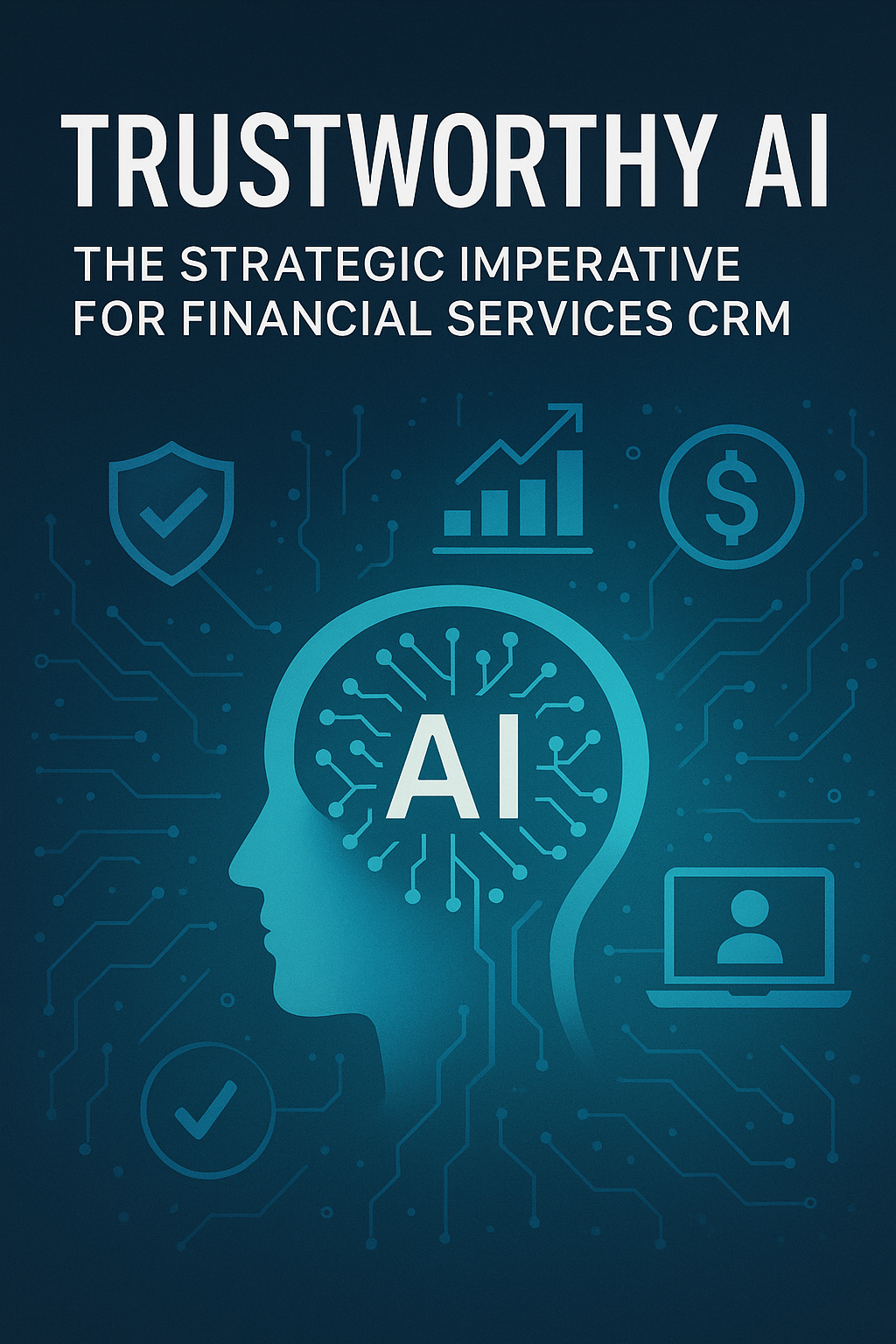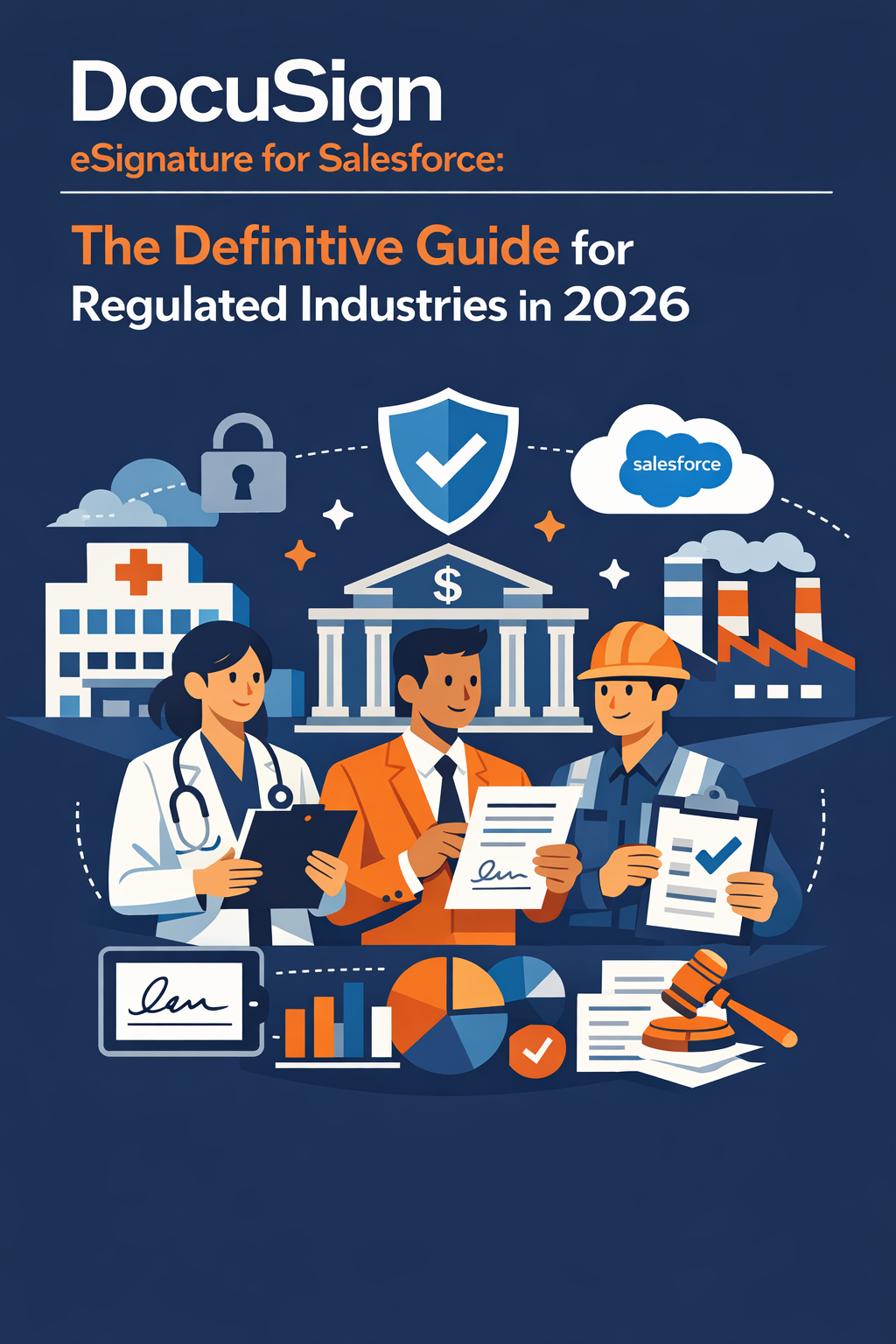
Why Governance-First AI Is the Competitive Advantage Financial Services Can't Ignore
In an era where artificial intelligence is rapidly transforming financial services, the question is no longer whether to adopt AI—but how to deploy it responsibly. For financial institutions serving high-net-worth clients, trustworthy AI represents more than a compliance checkbox; it's a strategic differentiator that can enhance client relationships, operational efficiency, and competitive positioning.
As financial advisors navigate the complexities of modern wealth management, integrating transparent, compliant, and ethical AI capabilities into CRM platforms like Salesforce Financial Services Cloud has become essential. This convergence of trustworthy AI principles with sophisticated CRM technology offers financial services firms a pathway to deliver personalized, data-driven experiences while maintaining the trust that is foundational to client relationships.
From Experimentation to Essential Infrastructure
The financial services sector in 2025 has reached a critical inflection point. AI has transitioned from an experimental tool to an indispensable operational component, with regulatory bodies intensifying their oversight as AI's role expands across functions—from fraud detection to personalized financial advice.
This transformation brings a dual reality:
The Opportunity: AI revolutionizes financial services by enabling hyper-personalization, predictive insights, real-time decision-making, and operational optimization. Financial institutions that effectively leverage AI gain competitive advantages through faster, smarter, and more customized services.
The Risk: Without proper governance, AI introduces systemic vulnerabilities including opaque decision-making, embedded bias, cybersecurity exposure, and operational dependencies that could amplify risks. The speed and scale of AI's capabilities make effective control challenging without clear oversight and ethical safeguards.
For wealth management firms and financial advisors, this duality is particularly acute. High-net-worth clients demand sophisticated, personalized service—but they also expect transparency, ethical treatment, and regulatory compliance. Trustworthy AI bridges this gap.
The Five Pillars of Trustworthy AI
1. Transparency and Explainability
The "black box" nature of many AI systems remains a significant challenge in financial services. When an AI model recommends a particular investment strategy or flags a transaction for review, stakeholders need to understand why.
Explainable AI (XAI) is essential for regulatory justification, demonstrating compliance with fair lending laws and anti-discrimination regulations. It builds client trust by providing clear explanations of AI-driven recommendations, and supports risk management by identifying when AI models may be producing unreliable outputs.
Financial institutions must prioritize transparent data practices and clear communication with both regulators and clients, preserving the personalized interactions that define quality financial advisory relationships.
2. Fairness and Bias Mitigation
AI models can perpetuate or amplify biases present in training data, leading to discriminatory outcomes in credit scoring, loan approvals, or investment recommendations. Regulatory bodies including the CFPB, DOJ, FTC, and EEOC have committed to enforcing existing laws to mitigate AI risks, particularly concerning algorithmic bias and digital redlining.
Trustworthy AI requires diverse, representative training data that reflects the full spectrum of client demographics, regular bias testing across protected classes, documented mitigation strategies when bias is detected, and ongoing monitoring to ensure fairness as models evolve.
For financial advisors working with diverse client bases, bias-free AI is not just an ethical imperative—it's a business necessity that protects both clients and the firm's reputation.
3. Data Privacy and Security
AI systems in financial services process vast amounts of sensitive client data, from transaction histories to personal financial goals. Compliance with data privacy regulations like GLBA, CCPA/CPRA, and GDPR is mandatory, with cross-border data transfers and third-party integrations introducing additional risks.
Trustworthy AI implementations must include data minimization, encryption and access controls, audit trails for regulatory review, and third-party risk management to ensure vendors and partners maintain equivalent security standards.
Platforms like Salesforce Financial Services Cloud incorporate features such as the Einstein Trust Layer, which uses metadata to detect and mask sensitive fields before data is exposed to AI processes, providing an additional security layer.
4. Human Oversight and Accountability
Despite AI's capabilities, human judgment remains essential for understanding client needs and navigating the complexities of financial advice. Research indicates that AI tools struggle to understand emotional states and build the trust that human advisors develop through empathy.
Trustworthy AI frameworks recognize this limitation by maintaining human-in-the-loop processes for critical decisions, establishing clear accountability for AI-driven outcomes, empowering advisors to override AI recommendations when appropriate, and preserving the advisor-client relationship as the foundation of wealth management.
The goal is not to replace human advisors but to augment their capabilities—freeing them from administrative tasks so they can focus on the high-value, relationship-building activities that AI cannot replicate.
5. Regulatory Compliance by Design
The regulatory landscape for AI in financial services is evolving rapidly, with a "sliding scale" approach emerging where oversight intensity corresponds to risk level. High-scrutiny applications include credit scoring, loan approvals, and algorithmic trading, while back-office automation receives lower scrutiny.
Financial institutions must adopt a "governance first" approach, integrating AI oversight, risk management, and compliance from the initial stages of development rather than as an afterthought. This includes reusable AI frameworks, model governance, continuous monitoring, and proactive regulatory engagement.
Transforming Financial Advisory Relationships
The integration of trustworthy AI into CRM systems creates powerful capabilities for financial advisors while maintaining ethical standards and regulatory compliance.
AI-Powered CRM Capabilities
Automated Administrative Tasks: AI tools save hours on data entry, portfolio monitoring, meeting preparation, note-taking, and follow-ups, allowing advisors to dedicate more time to client interactions.
Enhanced Client Insights: AI analyzes meetings to uncover client feelings, needs, and potential opportunities through sentiment analysis, providing advisors with deeper insights and historical intelligence.
Compliance Automation: AI-powered CRM systems improve compliance by automating record-keeping, tracking activities, and ensuring adherence to regulatory standards like SEC and FINRA.
Personalized Engagement: AI enables personalized service through timely communication and proactive support, identifying investment opportunities aligned with client goals and ethical preferences.
Workflow Optimization: Customizable workflows automate tasks for client onboarding, reviews, and compliance, creating efficiency gains that compound over time.
Salesforce Financial Services Cloud: Leading the Way
Salesforce Financial Services Cloud exemplifies how trustworthy AI can be integrated into CRM platforms to serve financial institutions. The platform combines AI capabilities with robust governance, security, and compliance features.
Agentforce for Financial Services provides proactive 24/7 support, automates tasks, and optimizes processes across banking, insurance, and wealth management with no-code setup, contextual AI built on existing Salesforce data, and comprehensive governance controls.
Einstein AI Integration delivers predictive insights through customizable dashboards, AI-driven recommendations for optimal client engagement, automated drafting of KYC summaries and client communications, and the Einstein Trust Layer for data security.
Unified Customer View leverages AI and Data Cloud to unify customer data from core banking, wealth, and insurance systems, creating comprehensive household insights and a 360-degree view of clients.
Real-World Impact: Efficiency Meets Ethics
The integration of trustworthy AI into CRM platforms delivers measurable business outcomes. Organizations report increased efficiency through automation of routine tasks, enhanced client experience with personalized and timely support, better decision-making backed by advanced analytics, reduced regulatory compliance risk, and higher ROI through productivity improvements.
Critically, these benefits are achieved while maintaining the transparency, fairness, and accountability that define trustworthy AI.
The Ethical Imperative
As AI becomes more prevalent in financial advisory, ethical considerations move to the forefront. While MIT researchers predict that AI could fulfill fiduciary duties within two to three years, significant challenges remain around emotional intelligence, fiduciary duty, conflicts of interest, and job displacement.
These challenges underscore why trustworthy AI—with its emphasis on transparency, fairness, accountability, and human oversight—is not just a technical requirement but an ethical imperative.
Strategic Recommendations
For financial institutions seeking to leverage AI while maintaining trust and compliance, consider these strategic priorities:
Adopt a "Governance First" Mindset: Integrate AI oversight, risk management, and compliance from the initial stages of AI development with clear policies for acceptable use, risk assessment, testing, and ongoing monitoring.
Invest in Explainable AI: Prioritize AI solutions that provide clear explanations for their recommendations, particularly for client-facing applications where trust depends on understanding.
Build Reusable AI Frameworks: Develop standardized data pipelines, governance structures, and model components that can be reused across multiple AI applications.
Emphasize Human-AI Collaboration: Position AI as an augmentation tool that enhances human advisors, focusing on use cases that free advisors from administrative tasks.
Prioritize Data Quality and Security: Recognize that AI is only as good as the data it's trained on, and invest accordingly in data quality initiatives and robust security controls.
Engage Proactively with Regulators: Don't wait for regulatory enforcement. Demonstrate your commitment to responsible AI use and stay ahead of evolving requirements.
Communicate Transparently with Clients: Be clear about how AI is being used in service delivery, provide explanations for AI-driven recommendations, and maintain channels for questions and concerns.
Monitor for Bias and Fairness: Implement regular testing for algorithmic bias across demographic segments and be prepared to adjust models when bias is detected.
The Competitive Advantage
In a crowded financial services marketplace, trustworthy AI offers a genuine competitive advantage. Firms that successfully integrate transparent, compliant, and ethical AI capabilities will differentiate on trust, attract high-net-worth clients, reduce regulatory risk, improve operational efficiency, and enable scalable personalization.
The Path Forward
Trustworthy AI is not a destination but a journey—one that requires ongoing commitment, investment, and vigilance. The financial services firms that will thrive in this AI-augmented future are those that recognize trustworthy AI not as a constraint but as an enabler—a way to deliver better outcomes for clients while managing risk and maintaining the trust that is foundational to financial relationships.
By integrating transparent, compliant, and ethical AI capabilities into CRM platforms, financial institutions can achieve the dual objectives of operational excellence and client trust. This is the promise of trustworthy AI: technology that enhances human judgment, respects individual dignity, and serves the best interests of clients.
In an industry where trust is the ultimate currency, trustworthy AI is not just good ethics—it's good business.
About the Author
David Cockrum founded Vantage Point after serving as Chief Operating Officer in the financial services industry. His unique blend of operational leadership and technology expertise has enabled Vantage Point's distinctive business-process-first implementation methodology, delivering successful transformations for 150+ financial services firms across 400+ engagements with a 4.71/5.0 client satisfaction rating and 95%+ client retention rate.
-
-
- Email: david@vantagepoint.io
- Phone: (469) 652-7923
- Website: vantagepoint.io
-



